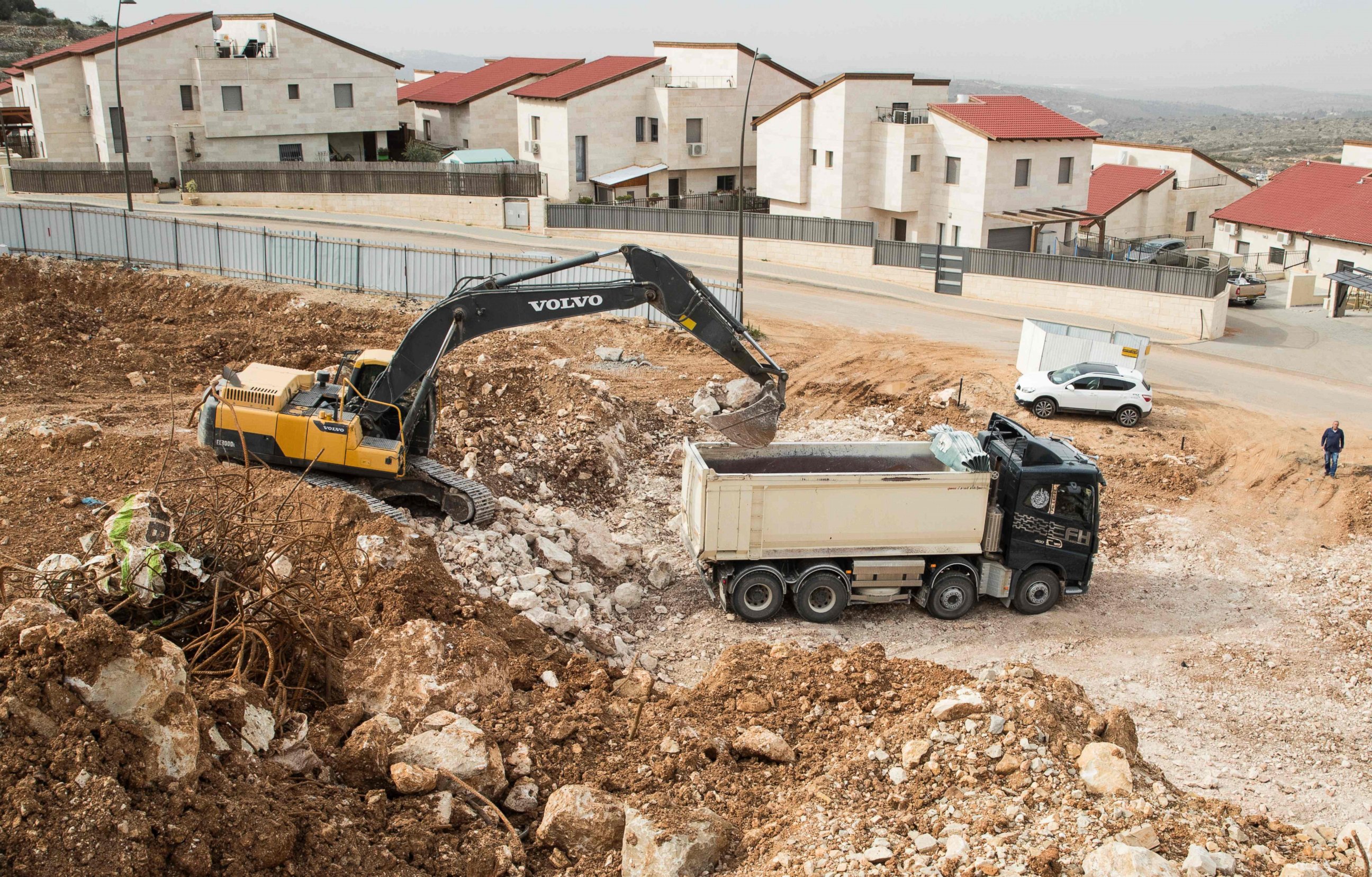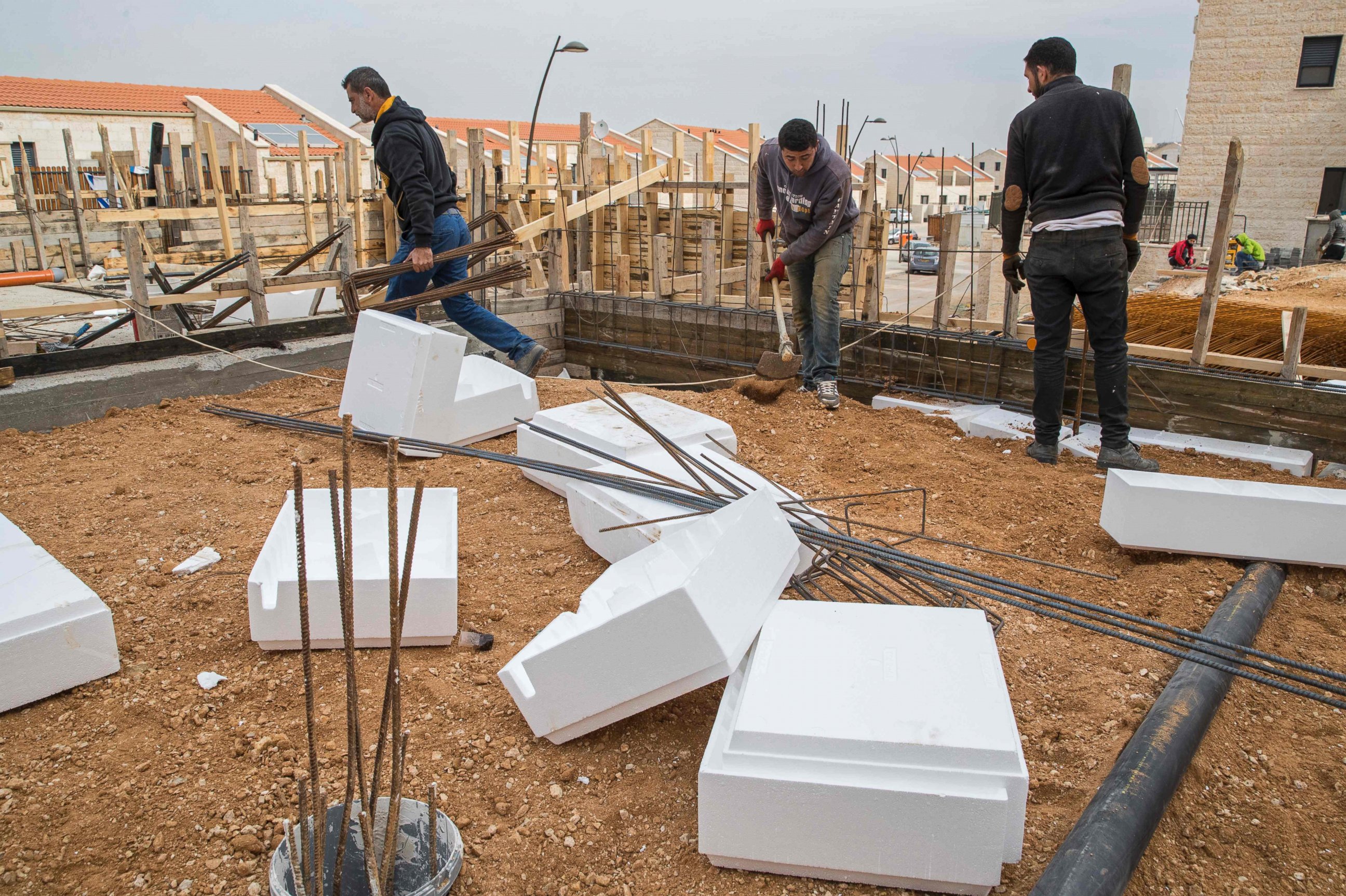Emboldened by Trump, Israel Ramps Up Settlement Expansion
More than 3,000 new units have been approved in the occupied West Bank.
—JERUSALEM -- U.S. President Donald Trump’s first days in office have coincided with the largest Israeli settlement expansion since 2013. Seemingly encouraged by the changes in Washington, Israel has approved more than 3,000 new units in the occupied West Bank, and it's just the beginning.
This week's announcements were just "a taste" of what's to come, Netanyahu told the Knesset Wednesday, taking questions from lawmakers. "We are going to be doing many things differently from now on," he said.
Just days after Trump was sworn in as president of the United States on Friday, the Israeli government announced the approval of nearly 600 new units in East Jerusalem on Sunday and 2,500 on Tuesday, all of which the United Nations considers illegal under international law.
"We're returning to normal life in Judea and Samaria," said Israeli Defense Minister Avigdor Lieberman, who lives in a settlement, using the biblical terms for the West Bank.
The Arab League's Secretary General Ahmed Abu al-Gheit, said the expansion is being used "to impose new facts on the ground," Palestinian news agency WAFA reported. His spokesman said that if this week is a hint of what's to come, "this would forever close the door on any peaceful settlement for the Israeli-Palestinian conflict."

"Trump's election has emboldened Israel to do whatever it wants, particularly as it relates to settlements," said Diana Buttu, a lawyer and former member of the Palestinian negotiating team. "By stating that he will appoint an ambassador who has openly supported Israel's settlements, Trump has effectively given Israel the green light to do whatever it wishes," she said, referring to Trump's pick for U.S. Ambassador to Israel, David Friedman, an ardent supporter of settlements.
While Jewish settlements in the West Bank and East Jerusalem grew steadily throughout the Obama administration, construction announcements were often followed by swift criticism from 1600 Pennsylvania Ave. The Trump White House, in its first few days, does not appear to be following that course.
"Israel continues to be a huge ally of the United States," said White House Press Secretary Sean Spicer in response to a question about the settlements, which previous U.S. administrations have called "illegitimate." "[Trump] wants to grow closer with Israel, to make sure that it gets the full respect that it deserves in the Middle East," he said, adding that settlements will be discussed in an upcoming meeting with Israeli Prime Minister Benjamin Netanyahu.
The most recent U.N. Security Council resolution, 2334, that condemns Israeli settlements in both East Jerusalem and the West Bank, was ratified in December 2016 when the U.S. abstained from voting. It states that settlements in the occupied Palestinian territories, including the West Bank and East Jerusalem, "have no legal validity." The Obama administration had taken the position settlements are a key obstacle to peace and therefore abstained from the historical U.S. action to veto such resolutions.
American Jewish groups have been divided in their opinion about existing settlements, but many have been vocal in their criticism of proceeding with new construction. The liberal Jewish advocacy group J-Street called the White House's failure to criticize this week's announcement of further building "unprecedented" breaking with "50 years of bipartisan opposition to settlement expansion."
"The new Trump administration should immediately condemn this decision and restate American opposition to Israeli settlements –- as all Republican and Democratic administrations have without exception since 1967," said J-Street's statement.
After Netanyahu's notoriously icy relationship with President Barack Obama, the conservative Israeli government said it sees "significant opportunities" in an American government that includes Jared Kushner, the president's son-in-law, and David Friedman as the nominee for U.S. ambassador to Israel. Those opportunities may also include a symbolic move of the U.S. Embassy in Israel from Tel Aviv to Jerusalem, a campaign promise Trump made but now appears more hesitant to follow through.
"After eight years of withstanding huge pressures on a large array of topics, first and foremost Iran and the settlements, I definitely welcome the change of attitude," Netanyahu said this week. The Prime Minister has reportedly pledged "unrestricted" construction in East Jerusalem, tweeting triumphantly, "We're building and will continue to build."
And that's what Palestinians fear.

Dr. Hanan Ashrawi, a member of the PLO Executive Committee, said the Israelis are "exploiting" the new administration, and the expansion "constitutes a war crime and the flagrant violation of international law and conventions, in particular U.N. Security Council resolution 2334."
She urged the U.S. and international community to "undertake serious and concrete measures to bring about a full cessation of all settlement activities."
The U.N. and European Union have also condemned the ramping up of Israeli construction in the West Bank.
"For the secretary general there is no Plan B for the two-states solution," said Stephane Dujarric, the spokesman for U.N. Secretary General Antonio Guterres. "In this respect, any unilateral decision that can be an obstacle to the two-state goal is of grave concern for the secretary general."
But Jared Kusher, who has been tasked by Trump to lead possible future negotiations between the Israelis and Palestinians, David Friedman and the nearly 600,000 settlers in the West Bank and East Jerusalem don't see it that way.
Oded Revivi, the Chief Foreign Envoy at the YESHA Council, which represents settlers living in the West Bank and the mayor of settlement Efrat that plans to build 21 units this week, welcomes the new era.
"We hope that this is just the beginning of a wave of new building across our ancestral homeland after eight years, very difficult years," he said. "We hope to continue building a peaceful future with the blessing of the new Trump administration."
Revivi said he knows Friedman personally and is bolstered by Friedman and Kushner's dedication to Israel. Friedman, who visits often and owns property in Jerusalem, has served as president for the American Friends of Beit El Institutions, a settlement near Ramallah that received approval for 20 units this week. The Kushner Family Foundation and Trump himself gave money to Beit El in 2003, according to the settlement founder.
"They've all proven their love and support for Israel," Revivi said today. "From the President on down."




